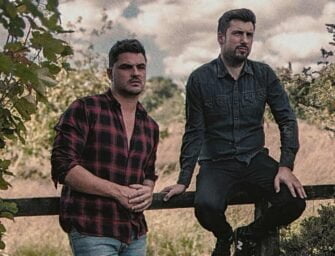
Suzanne Vega: “I wanted to write about the issue of child abuse, but I wasn’t sure how to do it…”
The legendary folk-pop singer-songwriter tells the remarkable story behind her song that tackled the subject of child abuse head on
New York singer-songwriter Suzanne Vega came to prominence in the 80s as a leading figure in the folk-music revival, inspired by the likes of Leonard Cohen, Lou Reed and Bob Dylan. She has released nine studio albums to date, but it was Suzanne’s sophomore LP Solitude Standing, released in 1987, that became the most popular and critically acclaimed of her career, with its second single Luka coming out later that year.
Although the song bravely tackles the disturbing issue of child abuse, Luka remains Suzanne’s highest-charting hit in the US, reaching No 3 on the Billboard Hot 100. The song also earned several Grammy nominations in 1988, including Record of the Year, Song of the Year and Best Female Pop Vocal Performance.
Celebrating both the album and single’s 25th anniversary this year, we caught up with Suzanne in Long Island and invited the iconic songwriter to tell the story of the powerfully emotive song…

Released: 21 May 1987
Artist: Suzanne Vega
Label: A&M Records
Writer(s): Suzanne Vega
Producer(s): Steve Addabbo, Lenny Kaye
UK chart position: 23
US chart position: 3
“It was probably late-summer in 1983 or ’84 and I lived in New York City, in Chelsea, on the corner of 8th Avenue and 23rd Street. I’d gotten mail wrongly delivered to my house and I saw the name on it said ‘Luka’. It was a children’s magazine, so I knew it was a child. I thought it was a fascinating name because not only could you not tell if it was male or female, you couldn’t tell what nationality it was – they could’ve been Middle Eastern or Italian, or almost anything.
Then I opened the door one day and I saw this kid waiting for the elevator – a fine-boned kid who was kind of tough and street-wise – he was about nine years old. I’d never seen him before, or maybe I’d seen him as part of a crowd of kids. I said, ‘What’s your name?’ And he said, ‘My name’s Luka,’ and I thought, ‘Oh you’re Luka.’ I said, ‘I get your magazines all the time,’ and he looked totally nonchalant and unconcerned. That was pretty much the extent of our conversation, but I thought of him as a character, and when I wrote the song I had no idea that anyone was thinking of it being a hit – I just took his name and his character and put them in the song, even though I had no evidence that he was being abused.
“It’s a song that took quite a few months for me to write, because I kept circling it in my mind. I knew I wanted to write about the issue of child abuse, but I wasn’t sure how to do it. It’s something I knew about, living in New York City in the 70s – it was a very turbulent time and the issue of abuse was never far from the surface. I’d been listening to a lot of Lou Reed’s Berlin, which is a fearless album, so I felt emboldened by listening to that album. There’s nothing that’s off limits; you really can write about anything. It doesn’t mean people will like it, but you have that freedom, and it’s really up to you whether you want to use that freedom or not.
“So I had the idea of writing a song about child abuse and then when I saw the name Luka I thought this would fit that song. Then when I saw the boy, it all kind of came together once I wrote the first few lines. I used to live on the ground floor, so everyone lived upstairs from me! I was imagining where he’d live and I suppose I was imagining being a neighbour hearing something. I had to craft it like a playwright, to make a triangle between Luka, the neighbour and the audience. So that’s sort of how I set it up, and once I got that angle I think I wrote it in two hours, one Sunday.
WE NEED MORE SONGS THAT ARE ABOUT ISSUES
“It honestly came together so quickly. With a lot of my songs, if I go through the notebooks, I’ll see the rough drafts where I’m working it out. But all [Luka] has is the song on the page, there’s no crossing out or tentative tries – it’s just complete. There’s not even the smidgen of a scratch-paper or a rhyming thing where I fill up the page with all the rhymes for a certain word – there’s none of that either, it’s just very clean. So I can only imagine that it just popped out! I guess I’d been thinking about it so much that it just came out the way it is.
“I felt the pressure because I’d been listening to the Lou Reed album, and it was an issue that was taboo. That secrecy comes out in the song too, and I was aware of that when I wrote it.
“I think if I had written a more formulaic song about abuse, no one would’ve listened. You’ve got to find a way to tell the story that’s meaningful. You can’t just write about an issue; you have to make it a story about a person. On the one hand don’t be afraid to tackle issues, but on the other hand bring it down to earth and make people really live in the moment of the story. That’s important, otherwise it’s just going to be a slogan.
“I actually wrote it before I had any kind of record deal, so I had it there as part of my collection of songs, before we chose the songs for my first album. So we saved it, specifically, for the second album. I liked the songs we’d chosen for the first album – I thought it made a good presentation – and that came out in 1985. With Luka I needed some time to get used to singing out in public a little bit, and my manager had an idea that this song could be a hit. He said, ‘It’s a song about an issue and we need more songs that are about issues.’ At first I argued with him and said, ‘I don’t think a song makes any difference,’ and we had a huge argument because he was of the generation previous to mine and felt music ended The Vietnam War! So he felt music had a huge social message and I was more sceptical. So I said, ‘Fine, if you want to make this into a hit then I’m not going to argue with you!’
“They spent a couple of years on the production, getting the arrangement right, getting the drum sound right, getting the sound of the solo just right, and in the end all of that diligence paid off because the minute it went to radio it was an instant hit – it started in Boston and spread quickly all over America and all over the world.
“Every time I sing Luka, I still love it, I still feel it has meaning to me and the people in the audience. There are people who have travelled long distances to hear that song. I sang it once in Taiwan and a housewife told me she’d travelled 15 hours to get there! When I hear that, I know why they’ve come and I know that’s the song they want to hear, and they don’t have to tell me any more – I really get it. It’s a song that still has a lot of emotion for a lot of people, so I never sing it by rote – I always still feel it when I sing it.
“For years I wondered whether the boy knew that I’d used his name in a song. My roommate who lived there, told me that years later: when he was like 15 years old, he came and knocked on the door one day and he had a girl with him, and he said, ‘Could you tell this girl that Suzanne Vega really did used to live here?’ So I guess he figured out he was the child in the song. Wherever he is, I wish him well and I hope he doesn’t mind that I took his name!”









![Songwriting Credits… best new music playlist [September 2023]](https://www.songwritingmagazine.co.uk/wp-content/uploads/songwriting-credits-september-2023-335x256.jpg)






























Related Articles